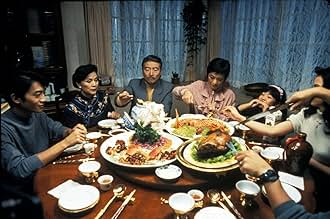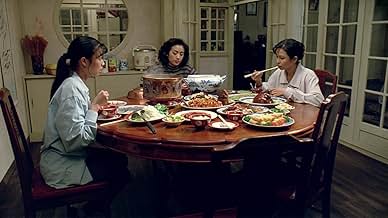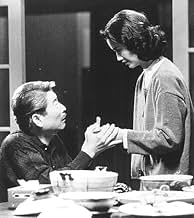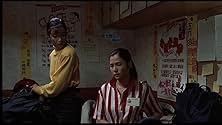CALIFICACIÓN DE IMDb
7.8/10
24 k
TU CALIFICACIÓN
Un chef vive con sus tres hijas mayores; la del medio encuentra sus planes futuros afectados por eventos inesperados y los cambios de vida de los otros miembros de la familia.Un chef vive con sus tres hijas mayores; la del medio encuentra sus planes futuros afectados por eventos inesperados y los cambios de vida de los otros miembros de la familia.Un chef vive con sus tres hijas mayores; la del medio encuentra sus planes futuros afectados por eventos inesperados y los cambios de vida de los otros miembros de la familia.
- Dirección
- Guionistas
- Elenco
- Nominado a 1 premio Óscar
- 6 premios ganados y 15 nominaciones en total
Wang Yu-wen
- Jia-Ning
- (as Yu-Wen Wang)
Chen Chao-jung
- Guo Lun
- (as Chao-jung Chen)
Ah-Lei Gua
- Madame Liang
- (as Ya-Lei Kuei)
- Dirección
- Guionistas
- Todo el elenco y el equipo
- Producción, taquilla y más en IMDbPro
Opiniones destacadas
By now, Ang Lee is best known for "Crouching Tiger, Hidden Dragon", "Brokeback Mountain" and "Life of Pi". If you're not familiar with his earlier work, it's worth checking out. Key among it is 1994's Academy Award-nominated "Yǐn shí nán nǚ" ("Eat Drink Man Woman" in English). I understand that this was part of what has become known as Lee's Father Knows Best trilogy. In this case, an aging chef in Taipei tries to come to terms with the different career paths that his daughters have chosen.
Without a doubt, the best part of the movie is seeing the food prepared. The opening scene shows the father preparing a feast for himself and his daughters. And boy does he put in a LOT of effort! But as the movie progresses, it becomes clear that the meals are only half the story. There's also the events in the characters' lives, as they seek out relationships. Might it also be time for the father to seek out a relationship?
This is definitely one that I recommend. As I read somewhere, the assortment of food representations life: there's a lot available, but you have to decide what you'll choose. A fine one. Another one of Lee's good movies is "The Ice Storm" (a downer if there ever was one).
Without a doubt, the best part of the movie is seeing the food prepared. The opening scene shows the father preparing a feast for himself and his daughters. And boy does he put in a LOT of effort! But as the movie progresses, it becomes clear that the meals are only half the story. There's also the events in the characters' lives, as they seek out relationships. Might it also be time for the father to seek out a relationship?
This is definitely one that I recommend. As I read somewhere, the assortment of food representations life: there's a lot available, but you have to decide what you'll choose. A fine one. Another one of Lee's good movies is "The Ice Storm" (a downer if there ever was one).
There is usually nothing that gets me away from my newspapers on a Sunday Morning. I usually spend several hours on my back porch immersed in news and entertainment. I flipped on the TV to see what was happening in the third round of the Masters and I noticed a movie on the Indie channel that I hadn't seen and it looked interesting. Big mistake! It Was And Lee's Yin shi nan nu (Eat Drink Man Woman). The paper got put aside as I couldn't tear my eyes away from the story. It was captivating, to say the least. How a widowed father deals with three daughters was the classic relationship film.In addition, the subplot, how everyone was doing something that they thought was "what was expected," instead of what they really wanted to do was a simple definition of life out of balance. Only when life is in balance can you taste the spice. You'll have to invest some time in watching this great film to understand that fully, and it will be time well spent.
This movie is a visually sumptuous confection served up by Ang Lee as a follow-up to The Wedding Banquet.
While some people may be put off that the film is in Mandarin with subtitles (and the DVD does not have a dubbing option), the film is so strong visually that you forget about the subtitles and just admire the thoroughly delightful story.
I found the film's theme very interesting...that life constantly surprises, especially if one opens themselves up to life's possibilities.
Nothing in this film plays out like you expect it to. It is the single common thread between the multiple story lines. If this film has a flaw it is that too many of the changes happen too suddenly, without an examination of the processes that led to the sudden developments.
The food scenes in this film are to die for. In this case, as opposed to being a primarily carnal sensual experience as it is in films like "Chocolat" and "Like Water For Chocolate," food also takes on a rhythmic intensity and meter here. There is amazing energy and balance displayed in the preparation and presentation of the meal. Sort of like Feng Shui for the tummy.
Bon Appetit.
While some people may be put off that the film is in Mandarin with subtitles (and the DVD does not have a dubbing option), the film is so strong visually that you forget about the subtitles and just admire the thoroughly delightful story.
I found the film's theme very interesting...that life constantly surprises, especially if one opens themselves up to life's possibilities.
Nothing in this film plays out like you expect it to. It is the single common thread between the multiple story lines. If this film has a flaw it is that too many of the changes happen too suddenly, without an examination of the processes that led to the sudden developments.
The food scenes in this film are to die for. In this case, as opposed to being a primarily carnal sensual experience as it is in films like "Chocolat" and "Like Water For Chocolate," food also takes on a rhythmic intensity and meter here. There is amazing energy and balance displayed in the preparation and presentation of the meal. Sort of like Feng Shui for the tummy.
Bon Appetit.
Ang Lee has turned what might have been merely an extended Taiwanese soap opera into a wise and warm exploration of family relationships, love and friendship, against the backdrop of a traditional society adapting to the modern world. Fascinating in themselves, the food preparation sequences serve as a metaphor for the skill required to transform bare existence into a rich life (and perhaps also as a metaphor for film making, where similar care and deftness are required).
The film focuses on the strained relations between master chef Chu (Sihung Lung) and his three unmarried daughters, and on the relationships of all four in love and at work. These relationships run the gamut from first love to love the second time around; from those based almost solely on sex to those based on none. (Some of the most touching scenes are those between Chu and his older colleague Wen (Jui Wang.))
Via the various workplaces Lee subtly shows us the changing face of Taiwanese society. Despite her father's profession, and seemingly with his approval, his youngest daughter works in a fast-food outlet; the eldest has converted to Christianity, and teaches science to boys, who treat her with a mixture of traditional deference and western-style insolence; the middle daughter is a successful airline executive, but only because time-honoured attitudes debarred her, as a woman, from following in her father's footsteps as a cook.
Unlike the classic Hollywood film, there is little out-and-out conflict in this movie, which seems to be based more on the Chinese philosophical concept of Yin and Yang, mutually dependent opposites. But whatever its underlying cinematic rationale, it is a masterpiece.
The film focuses on the strained relations between master chef Chu (Sihung Lung) and his three unmarried daughters, and on the relationships of all four in love and at work. These relationships run the gamut from first love to love the second time around; from those based almost solely on sex to those based on none. (Some of the most touching scenes are those between Chu and his older colleague Wen (Jui Wang.))
Via the various workplaces Lee subtly shows us the changing face of Taiwanese society. Despite her father's profession, and seemingly with his approval, his youngest daughter works in a fast-food outlet; the eldest has converted to Christianity, and teaches science to boys, who treat her with a mixture of traditional deference and western-style insolence; the middle daughter is a successful airline executive, but only because time-honoured attitudes debarred her, as a woman, from following in her father's footsteps as a cook.
Unlike the classic Hollywood film, there is little out-and-out conflict in this movie, which seems to be based more on the Chinese philosophical concept of Yin and Yang, mutually dependent opposites. But whatever its underlying cinematic rationale, it is a masterpiece.
Preparing food is a lot like making and sustaining relationships; mixing hot and cold, balancing flavors, starting with good ingredients or not, being creative, adding spice and trying new things without losing identity and soul.
A master chef and his trio of mature and live-at-home daughters are each single, unattached and in a funk. Despite living under one roof they move in separate spheres and hardly communicate. Only Sunday dinners, painstakingly made by the father, bind them together. Passions flare as each family member finds themselves on the cusp of a new relationship. Ingredients long held in deep freeze are brought to the boiling point, disparate flavors combine, and the results are unexpected and startling. The point is to savor the dish and not interfere with the cook making it, for we hardly know enough to prepare our own meal much less those of other people.
Director Ang Lee is a master at metaphor and stewing passions. Even at this early stage in his career you may witness his power and prowess in such respects. A warning: do not watch this film on an empty stomach, for the cooking scenes will make your mouth water and whatever is in your pantry - be it raw flour or curry powder - will certainly be consumed in a fit of madness and feeding frenzy.
A master chef and his trio of mature and live-at-home daughters are each single, unattached and in a funk. Despite living under one roof they move in separate spheres and hardly communicate. Only Sunday dinners, painstakingly made by the father, bind them together. Passions flare as each family member finds themselves on the cusp of a new relationship. Ingredients long held in deep freeze are brought to the boiling point, disparate flavors combine, and the results are unexpected and startling. The point is to savor the dish and not interfere with the cook making it, for we hardly know enough to prepare our own meal much less those of other people.
Director Ang Lee is a master at metaphor and stewing passions. Even at this early stage in his career you may witness his power and prowess in such respects. A warning: do not watch this film on an empty stomach, for the cooking scenes will make your mouth water and whatever is in your pantry - be it raw flour or curry powder - will certainly be consumed in a fit of madness and feeding frenzy.
¿Sabías que…?
- TriviaThe opening sequence - in which a Sunday lunch is lovingly prepared - took over a week to film.
- ErroresAs Chu is downing shots at the last Sunday dinner, he spills some on the collar of his jacket. When he stands up to makes his announcement, the stain is gone.
- Bandas sonorasAve Maria
Composed by Giuseppe Verdi
Performed by The Westminster Choir
Courtesy of Chesky Productions, Inc.
Selecciones populares
Inicia sesión para calificar y agrega a la lista de videos para obtener recomendaciones personalizadas
- How long is Eat Drink Man Woman?Con tecnología de Alexa
- Is 'Eat Drink Man Woman' a sequel to 'The Wedding Banquet'?
Detalles
- Fecha de lanzamiento
- Países de origen
- Idiomas
- También se conoce como
- Comer, beber y amar
- Locaciones de filmación
- Productoras
- Ver más créditos de la compañía en IMDbPro
Taquilla
- Total en EE. UU. y Canadá
- USD 7,294,403
- Fin de semana de estreno en EE. UU. y Canadá
- USD 155,512
- 7 ago 1994
- Total a nivel mundial
- USD 7,294,403
- Tiempo de ejecución2 horas 4 minutos
- Color
- Mezcla de sonido
- Relación de aspecto
- 1.85 : 1
Contribuir a esta página
Sugiere una edición o agrega el contenido que falta

Principales brechas de datos
By what name was Comer, beber, amar (1994) officially released in India in English?
Responda































